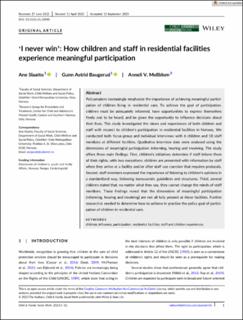‘I never win’: How children and staff in residential facilities experience meaningful participation
Peer reviewed, Journal article
Published version
Date
2023Metadata
Show full item recordCollections
Original version
10.1111/cfs.13090Abstract
Policymakers increasingly emphasize the importance of achieving meaningful participation of children living in residential care. To achieve the goal of participation, children must be adequately informed, have opportunities to express themselves freely and to be heard, and be given the opportunity to influence decisions about their lives. This study investigated the views and experiences of both children and staff with respect to children's participation in residential facilities in Norway. We conducted both focus-group and individual interviews with 6 children and 18 staff members at different facilities. Qualitative interview data were analysed using the dimensions of meaningful participation: informing, hearing and involving. The study offers three main findings. First, children's initiatives determine if staff inform them of their rights, with two exceptions: children are presented with information by staff when they arrive at a facility and/or after staff use coercion that requires protocols. Second, staff members expressed the importance of listening to children's opinions in a standardized way, following bureaucratic guidelines and structures. Third, several children stated that, no matter what they say, they cannot change the minds of staff members. These findings reveal that the dimensions of meaningful participation (informing, hearing and involving) are not all fully present at these facilities. Further research is needed to determine how to achieve in practice the policy goal of participation of children in residential care.

